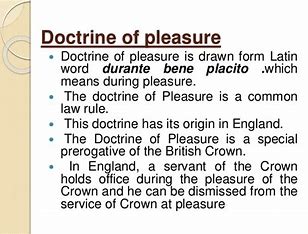In English law, the doctrine of pleasure first emerged. An official of the Crown must serve during the pleasure of the Crown, according to English morality. This means that the Crown has the right to terminate his services at any moment and without giving a reason. The Indian Constitution, Article 311- No one who is a member of the Union civil service, an all-India service, a State civil service, or who holds a civil office under the Union or a State may be fired or removed by a higher authority than the one that appointed him. This idea was developed in England, as was previously noted. In England, the civil services are considered to be a part of the Executive, with the Crown serving as its head. According to the theory of pleasure, the Crown has the authority to fire a civil worker at any moment without providing the employee with a notice of termination. Therefore, they serve at the discretion of the Crown, which has the authority to fire them at any time. The ability to sue the Crown for wrongful termination and the right to seek damages as a result of wrongful termination are not available to civil servants who have been terminated from their employment.
In India, the doctrine of pleasure is also practised. According to this idea, the President of India has the authority to dismiss a civil servant at any time because he serves as the Executive Head of the Union and holds the same status as the Crown in England. While this philosophy has been adopted in India, it has not been slavishly reproduced in the same way that it is practised in England, and there are some differences between this doctrine as adopted in India and as practised in England. The provision for this theory in India is embodied in Article 310 of the Indian Constitution. Although the idea of pleasure was adapted from the British legal system, it has been changed to fit the Indian setting in accordance with the country’s current social structure. The judiciary’s ability to conduct judicial reviews has been crucial in balancing this doctrine’s arbitrary elements. India elects its executive head through elections, but England has a Monarch as the executive head. Thus, the adage “The King can do no wrong” is inappropriate for the situation in India. Notwithstanding judicial intervention, the protection’s exceptions are still subject to abuse. Consequently, it would be preferable if specific rules were specified that must be followed in order to qualify for these exceptions rather than analysing each and every case of arbitrariness.
“PRIME LEGAL is a full-service law firm that has won a National Award and has more than 20 years of experience in an array of sectors and practice areas. Prime legal fall into a category of best law firm, best lawyer, best family lawyer, best divorce lawyer, best divorce law firm, best criminal lawyer, best criminal law firm, best consumer lawyer, best civil lawyer.”


